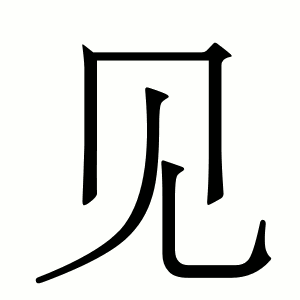见 jiàn see; meet
Made up of [冂 jiōng covering box radical 13, 儿 ér legs radical 10]Used as component 见 in :现 xiàn
Alternative traditional form of character: 見
Made with 4 strokes.
Combines an eye and a person, now uses a simplified form
Related characters
Also uses 冂 jiōng component: 冈 gāng (ridge) 丽 lì (beautiful) ; 两 liǎng (pair) ; 南 nán (south) ; 内 nèi (inner) ; 尚 shàng (still) ; 商 shāng (commerce) ; 同 tóng (same) ; 网 wǎng (net) ; 雨 yǔ (rain) ; 再 zài (again) ; 周 zhōu (circuit)
Also uses 儿 ér component: 儿 ér (child) 光 guāng (light) ; 克 kè (to be able to) ; 免 miǎn (to escape) ; 兔 tù (rabbit) ; 先 xiān (first) ; 兄 xiōng (elder brother) ; 元 yuán (primary) ; 真 zhēn (really)
Sounds same
健 jiàn (healthy) ; 渐 jiàn ; 建 jiàn (to establish) ; 间 jiàn (gap) ; 箭 jiàn (arrow)Different tone
戋 jiān (narrow) ; 艰 jiān (difficult) ; 间 jiān (between) ; 蹇 jiǎn ; 剪 jiǎn (scissors)Pronunciation
Sound file kindly provided by shtooka.net ➚ under a Creative Commons Attribution Share Alike License

Stroke order for character 见, kindly provided under Wikimedia creative commons license ➚
Proverbs
百闻不如一见 bǎi wén bù rú yí jiàn Delighted to meet you in person at last. Seeing at first hand gives valuable information. The story is of a Han dynasty veteran general Zhao Chongguo who went to see the situation for himself at the frontier rather than relying on secondhand reports. His wise analysis quickly solved the problem with the incursions of northern tribes患难见真情 huàn nàn jiàn zhēn qíng Only in a crisis do you know who your friends really are
见义勇为 jiàn yì yǒng wéi To see what is right and act with courage
开门见山 kāi mén jiàn shān To come straight to the point. Avoid procrastination
少见多怪 shaǒ jiàn duō guài Unsettled by a new environment
司空见惯 sī kōng jiàn guàn Sikong was the job title of a minister of works in China. In the Tang dynasty the poet Liu Yuxi was invited by a minister to a feast accompanied by entertainers. This was a common occurrence for the minister but greatly impressed the poet. An everyday occurrence; nothing out of the ordinary
Phrases
再 见 zài jiàn Goodbye明 天 见 míng tiān jiàn See you tomorrow